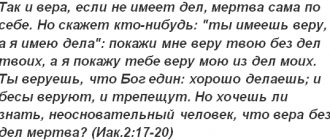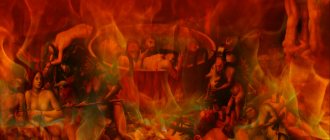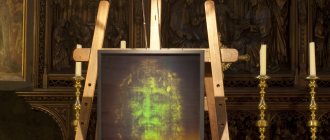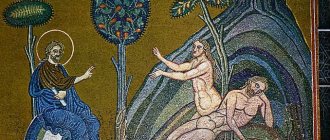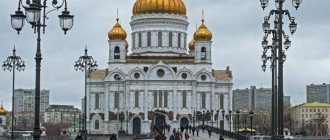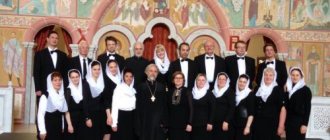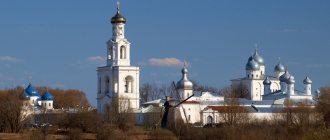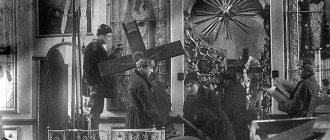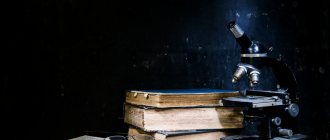Culture
Both believers and atheists are constantly waiting for clear evidence that will confirm or deny the existence of God.
Below is a list of theories and studies carried out by scientists from various fields who have worked to prove the existence of God, Heaven and Hell.
Do they provide real facts or are they still conjecturing many things? You decide!
1. The scientist who “dug” the road to hell in Siberia and recorded the cries of damned souls (1989)
What actually happened:
The Soviet Union drilled a deep hole in the ground - the Kola Superdeep Well (12,262 meters). The well is located on the Kola Peninsula. After its completion, quite interesting geological anomalies were discovered, but as it turned out, there was nothing unusual, much less supernatural, about them.
What the legend says:
According to legend, in 1989, a group of Russian scientists working under the direction of Dr. Azakov was drilling a hole almost 15 kilometers deep in an unnamed location in Siberia when they came across a bottomless cavity.
Intrigued by the unexpected find, they lowered a heat-resistant microphone into the hole along with other sensory equipment. According to experts, they were able to record and then hear the anguished screams of desperate people.
The second surprise was the incredibly high temperature they discovered in the center of the Earth (more than 1000 degrees Celsius). As a result, they came to the conclusion that they had opened the road to hell.
This story was first published in 1990
in the Finnish newspaper Ammennusatia, published by a group of Christians from the city of Leväsjoki, which is located in Western Finland.
Soon the story was picked up by numerous American and European media, and sound files of the alleged sufferers flooded the entire Internet
. Immediately, Trinity Broadcasting Network (TNB) began discussing the audio track on all of their gospel channels, saying it was definitive evidence that hell exists.
ARTEM OGANOV
Artem Oganov is a world-famous Russian crystallographer, president of the Russian-American Association of Scientists, head of the Skolkovo Institute and three scientific laboratories in the USA, China and Russia. Included in the list of "10 most successful Russian scientists" by Forbes .
“I agree that science is the greatest achievement of human culture. But the fact that science can help a person in everything, satisfy all human needs, is, of course, not true. That's funny. If you are tormented by remorse, science will not help you at all.”
“Science can extend your life, give you physical health, improve your quality of life. Science can satisfy your curiosity. You know what pleasure I get when I tell my children, for example, about black holes. At this moment you relive the delight of knowledge: how amazing the world we live in is! Why is he so amazing? Where did the laws that govern this world come from? Aren't these laws strange? This is where some kind of bridge appears, perhaps with faith. And who actually gave these laws? Well, we can say that no one. And we can say that Someone. And then believers and non-believers diverge, and no one will ever be able to prove anything to anyone.”
“I think we will never be able to prove the existence of God using scientific methods. But this should not confuse us, because in science itself there are statements that cannot be proven. We call them axioms, and the entire edifice of science is built on these statements. Therefore, this is the way of human knowledge. We need to take something on faith, but this something should be intuitively close to us. Well, for example: parallel lines do not intersect. You will never prove it, but we intuitively feel it. Just like God. Some of us intuitively feel that God exists. And therefore they may well accept this as a truth that does not require proof. I believe that to the best of my five senses I have received my proof of the existence of God.”
Read the full interview of Vladimir Legoyda with Artem Oganov on the Foma website or watch the episode of Parsuna.
RADIY ILKAEV
Radiy Ilkaev - Academician of the Russian Academy of Sciences, Doctor of Physical and Mathematical Sciences, honorary scientific director of the Russian Federal Nuclear Center - All-Russian Research Institute of Experimental Physics.
He did a lot to preserve the nuclear center of our country in the 90s. The Church helped convince the authorities that the nuclear center cannot be divided. Ilkaev did not approach her lightly: the Institute was located on the former territory of the Holy Dormition Monastery of Sarov Monastery . Today nuclear scientists consider St. Seraphim of Sarov their patron, and Ilkaev himself is one of the initiators of the 2003 celebrations dedicated to the 100th anniversary of the glorification of the St.
“The most important thing in science is insight. The highest achievements of scientific thought come through insight. And this is certainly not a scientific and technical phenomenon. It is characteristic of spiritual life; it is realized and comprehended there. The history of science has a lot to do with insights. And there is no serious contradiction between the highest achievements of scientific thought and the highest achievements of spiritual life. But where does it come from - insight? It is not a consequence of any specific formula, calculation or measurement. It comes from above. This needs to be emphasized sometimes, because if you forget about this side of a scientist’s work, it actually just dilutes science.”
“This is a difficult time for science in Russia, we need to fight. And here I will allow myself one remark. The Russian Orthodox Church has enormous power these days. My personal opinion: it contains the moral basis of civil society. Her public point of view, including on science, that is, in fact, on the future intelligence of the nation, is very significant. Some officials and leaders now listen much more to the Church than to scientists. Therefore, I consider it very important to have a dialogue between the Church and science in a careful, constructive form.”
You can read about how holiness and nuclear physics are combined in the letters of Radiy Ilkaev’s colleagues about St. Seraphim of Sarov.
Quotes from famous politicians
“The Bible is the best gift God has ever given to man. All the best from the Savior of the world is transmitted to us through this book.” (Abraham Lincoln)
“Our lives should be the sermon, not our words.” (Thomas Jefferson)
“I knew 95 outstanding people in the world, and 87 of them were Bible followers.” (William Gladstone)
“It is impossible to properly rule the world without God and the Bible.” (George Washington)
“I give credit to my parents for instilling in me a love of the scriptures from an early age. If we adhere to the principles taught in the Bible, our country will be in a state of continued prosperity." (Daniel Webster)
“The whole hope of human progress rests on the ever-increasing influence of the Bible.” (William Seward)
“It is impossible to enslave mentally or socially a people who read the Bible. Biblical principles are the foundation of human freedom.” (Horace Greeley)
“The Bible is an extraordinary book. She is a Living Being who conquers everything that opposes her.” (Napoleon)
“The teaching of the Bible is so intertwined with our civil and social life that it is impossible to imagine human life if this teaching were removed from it. With the removal of the Bible we will lose all foundation.” (Theodore Roosevelt)
"I attribute to the Bible the greatness of England." (Queen Victoria of Great Britain)
“So great is my respect for the Bible that the sooner my children begin to read it, the more confident I am that they will become useful citizens of their country and respected members of society.” (John Adams)
“Reading the Bible always gives the most effective consolation. I don't know anything to compare it with. Both the Old and New Testaments equally strengthen the soul.” (Wilhelm von Humboldt)
“An atheist is an unhappy child who tries in vain to convince himself that he has no father.” (Benjamin Franklin)
“Superstition is a religion for weak minds.” (Edmund Burke)
“God is love, this is the only truth that I fully recognize.” (Mahatma Gandhi)
EVGENY VODOLAZKIN
Evgeny Vodolazkin is a writer, literary critic, Doctor of Philology, employee of the Department of Old Russian Literature of the Institute of Russian Literature of the Russian Academy of Sciences (Pushkin House). Specialist in the field of ancient Russian historical narrative, exegesis and hagiography. Honorary Doctor of the University of Bucharest.
“If I am mortal, then why do everything I do? This thought shook me to the core. Why do I need everything if I leave, become grass, trees? The only answer for me was faith. Moreover, what’s interesting is that I began to believe “in something” much earlier than I thought about the vanity of existence. But it was precisely faith “in something,” a kind of personal paganism. In some tense life situations, I asked for help from something... from something that I myself did not understand. And here, by the way, we can remember that man in his development repeats the path of humanity. This is how most European peoples passed from paganism to Christianity, so I made this transition at the age of sixteen.”
“I always say that there are only two points that concern a person in the world: religion and art. Nobody takes people seriously anymore. Deals with its periphery, sphere of life and other things. But they do things differently. Of course, I see hierarchical relationships here. Because religion is the highest. Art is always inferior, I say this completely calmly and without the slightest jealousy, because in its pure form only religion deals with man. But art is concerned with discovering the undiscovered, cognizing the unknown.”
Read the full text of Vladimir Legoyda’s conversation with Evgeniy Vodolazkin on the Foma website or watch the Parsuna issue.
We also highly recommend finding out what meaning Evgeny Vodolazkin put into his first novel “Laurel”.
ALEXANDER DOBROHOTOV
Alexander Dobrokhotov is a historian, Doctor of Philosophy, professor of the Department of Cultural Sciences, School of Cultural Studies, Faculty of Humanities, National Research University Higher School of Economics, head of the Department of Cultural Studies, Missionary Faculty of PSTGU. Visiting professor at the Catholic University of Tilburg (Netherlands), University of Friborg (Switzerland), Geneva (Switzerland).
“Scientific knowledge, unlike theology, explains specific phenomena of the visible world - no more, but no less. Thomas Aquinas later clarifies that science may sometimes overlap with theology in subject matter, but not in method. And today, in the light of accumulated experience, we can agree with them: there can be no conflict zones between science and religion at all. Basically. They talk about different things and in different languages.”
“Even when it was already possible to talk about one’s lack of faith without any danger or career consequences, we see that the majority of scientists did not renounce their faith, although their religious views were often specific. And it seems to me that for a person of science there is generally nothing conflicting in faith and knowledge. A scientist wants to see the whole and the interconnections of different phenomena and facts. And it is quite natural for him to believe, and engage in science, and live in the world of art, etc. After all, as was said above, these are completely non-conflicting phenomena.”
“The scientific world is structured in such a way that it constantly generates crises, which it then overcomes, giving rise to new ones. Otherwise, it freezes and turns into some kind of doctrinaire, ideologeme, and this contradicts the very idea of scientific knowledge. A scientist can never get enough. He will never say “enough is enough.” He is constantly looking for new problems. This is one of the most important and fundamental principles of scientific knowledge. And this, by the way, is one of the reasons why it is not so difficult for a man of science to understand a man of faith.”
Read about predestination, freedom of choice and other philosophical topics in the series “Topical Philosophy with Alexander Dobrokhotov.”
Quotes from famous scientists
“The more I study nature, the more I am in awe of the works of the Creator.” (Louis Pasteur)
“The Bible contains more evidence of authenticity than all of secular history.” (Isaac Newton)
“Religion, art and science are branches of the same tree.” (Albert Einstein)
“I am not obliged to believe that the same God who gave us feelings, common sense and reason requires that we give up the use of them.” (Galileo Galilei)
“Isn’t it surprising that people so often fight for religion and so rarely live according to its precepts?” (Georg Lichtenberg)
“Science without religion is lame, religion without science is blind.” (Albert Einstein)
“I cannot imagine the Universe and human life without some kind of meaningful principle, without a source of spiritual warmth that lies outside matter and its laws. Probably, such a feeling can be called religious.” (Andrey Sakharov)
“The day will come when they will laugh at the stupidity of our modern materialistic philosophy.” (Louis Pasteur)
“The order of the Universe, which unfolds before our eyes, itself testifies to the truth of the greatest and most sublime statement: “In the beginning was God.” (Arthur Compton)
“In the infinite universe the activity of an infinitely perfect Mind is revealed.” (Albert Einstein)
“I am amazed that people choose to wander in the dark on so many important issues when God has given them such a wonderful book of revelation.” (Michael Faraday)
“I cannot understand a scientist who would not recognize the Supreme Mind in the entire system of the universe, just as I could not understand a theologian who would deny the progress of science. Religion and science are sisters." (Wernher von Braun)
“A scientist has much more reason to believe in God today than he did 50 years ago, because science has now seen its limits.” (Hansjochem Otto Outrum)
“There is no contradiction between God the creator and what we have already discovered in the Universe; it is quite possible to be a religious person and a scientist at the same time.” (Peter Higgs)
“Compared to the Bible, all human books, even the best, are only planets, borrowing all their light and radiance from the Sun.” (Robert Boyle)
“Whoever makes an attempt to depict the history of the universe, this attempt cannot represent anything higher and more worthy than the biblical account of creation.” (John Dawson)
“A mathematician is falsely reasonable if he wants to measure God’s will with a compass. The same is true of a theological teacher if he thinks that one can learn astronomy or chemistry from the psalter.” (Mikhail Lomonosov)
“The discovery of the laws of nature initially caused sharp opposition, almost accusations of blasphemy. Now, however, we recognize that the laws of God's world make it even more amazing and beautiful, that the greatness and wonderful precision of the functioning of the Universe is the result of the action of natural laws, which God uses as an instrument. (Igor Sikorsky)
“It is not our business to prescribe to God how he should govern this world.” (Niels Bohr)
“The wonderful structure of the cosmos and the harmony in it can only be explained by the fact that the cosmos was created according to the plan of an omniscient and omnipotent God.” (Isaac Newton)
“Every serious natural scientist must be in some way a religious person. Otherwise, he is not able to imagine that those incredibly subtle interdependencies that he observes were not invented by him.” (Albert Einstein)
“If God did not “lay us down” from time to time, we would have no time to look at the sky.” (Blaise Pascal)
“Everyone adapts God to himself, and not himself to God.” (Vladislav Skripnichenko)
“I needed an abstract, unattainably high ideal of faith. And having taken up the Gospel, which I had never read before, and I was already 38 years old, I found this ideal for myself.” (Nikolai Pirogov)
